Joseph Henry Blackburne - The Black Death

Joseph Henry Blackburne
At one stage he was second only behind Wilhelm Steinitz. He was consistently among the top 5 in the world throughout the 1870s and 1880s and remained in the top 20 for a decade or two after that.
He achieved his great success in high level tournaments through his very creative attacking play. This gained him many 2nd and 3rd place finishes throughout his heyday accompanied even by a couple of tournament victories.
Young Joseph
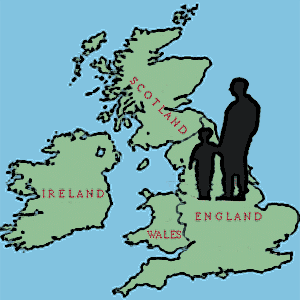
Joseph Henry Blackburne traveled throughout Britain and Ireland with his father as a boy
He traveled across Britain and Ireland with his father as he grew up. Joseph's father was preaching as a temperance reformer, speaking out against the evils of alcohol and advising all against the dangers and pitfalls of the demon drink.
It's hard to say how successful old Blackburne was on his mission but we know one listener who ignored his advice. His own son. Young Joseph would later become infamous for playing great chess while under the influence of whiskey. He would even claim that it made him play better!
Legend of Morphy

Joseph Henry Blackburne was inspired by the exploits of Paul Morphy
Newspapers and magazines were giving a daily commentary on Morphy's latest games and the ongoing saga involving the proposed match against Howard Staunton.
Blackburne was so interested in Morphy's story that he learned to play chess. He joined the Manchester Chess Club in July, 1861 and before long it was clear he was no ordinary player. Within months he had acquired such status that he got a match against the Manchester Champion, Edward Pindar.
Early Matches vs Pindar
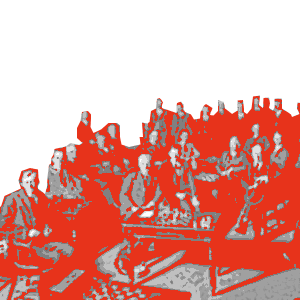
Joseph Henry Blackburne faced Edward Pindar at Manchester Chess Club
Blackburne was undeterred by the setback and continued to improve rapidly. It was not long at all before he was facing Pindar again. There would be a different outcome second time around. Blackburne won 5-1, with 2 games drawn.
Now the best player in Manchester, he would broaden his horizons. His younger days of constant moving prepared him well for the life of a professional chess player. He would spend much of the next 60 years on the road making his living from the Game of Kings.
Blindfolds and Simuls

Joseph Henry Blackburne became a blindfold specialist
He was hugely impressed by the whole spectacle and soon began to play blindfold against multiple opponents. Paulsen was playing against sometimes 10 at a time. Blackburne started out against 3 opponents at a time and worked his way up over the years.
This kind of thing would later prove to be a reliable source of income for Blackburne. Later when he was a big name he could command a handsome price for simultaneous blindfold exhibitions.
London 1862
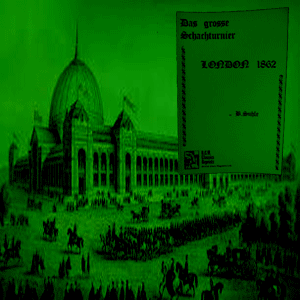
Joseph Henry Blackburne finished a credible 10th out of 14 competitors at London 1862
This was the first major tournament since the retirement of Morphy. The winner would be top dog in the world of chess. All of the strongest players in the world would compete against the top English players in the London Chess Tournament of 1862.
Anderssen, Steinitz, Paulsen, Barnes and Lowenthal would be there among others. One of those others was the up and coming Joseph Blackburne. Unlike 1851, the tournament was played on a league system. Blackburne finished 10th out of 14 with wins over Owen, Steinitz, Lowenthal and Green.
Blackburne the Professional
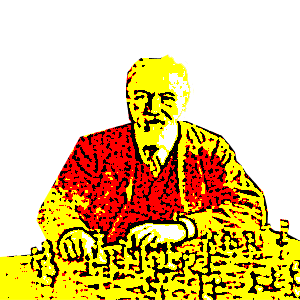
Joseph Henry Blackburne turned professional after losing his job in a warehouse
He went back to Manchester to resume his job in a warehouse. Bills had to be paid after all. When he went to his job he discovered that they had replaced him and he was out of work.
He did not bother trying to find similar work. He already knew how he wanted to make a living. Rubbing shoulders with the best chess players in the world and performing credibly gave him confidence that his future lay in this field. He would now make his living from chess. Joseph Blackburne would be a professional chess player. He played a match against William Steinitz in 1863. Steinitz won 7-1 (2 games drawn).
British Champion
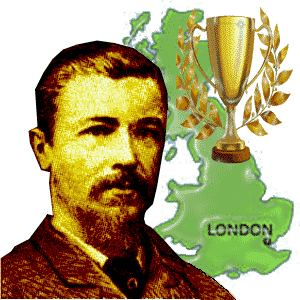
Joseph Henry Blackburne became British Champion in 1869
He was maturing into a really top professional. He got 4th place in Dundee in 1867. He was by now a pretender to the British chess crown.
Over the next two years Blackburne would continue his steady climb. By the end of the 1860s he was ready. He would have to overcome the British Champion, Cecil de Vere. He did just that and captured the British Championship in 1869.
Baden-Baden 1870

Joseph Henry Blackburne competed in Baden-Baden 1870
The 1870s and 1880s would prove to be his greatest years as he would be ever present in the World Top 5 throughout these two decades. The first great tournament of the 1870s would take place in Baden-Baden, Germany.
A very strong field turned out for this tournament. Blackburne took joint 3rd with Gustav Neumann, a half point behind Steinitz in second and only a point behind Anderssen in first. He won 200 Francs for his effort. More importantly he had announced his arrival as a contender to be reckoned with.
The Black Death
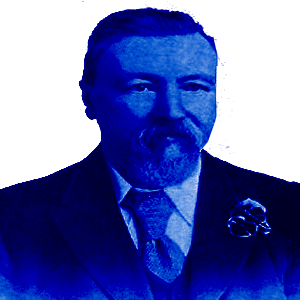
Joseph Henry Blackburne earned the nickname The Black Death at the 1873 Vienna Tournament
Vienna held a World Exhibition across the summer of 1873. A major international chess tournament was organized as part of the event. 12 of the world's strongest players took part. The competition took place between July and August.
Blackburne topped the league phase (21.5 points) and Steinitz finished second (20.5 points). These two would meet in a playoff to decide the championship. Steinitz won the playoff 2-0. Steinitz was now proclaimed as the best player in the world. Many people felt that Blackburn was possibly the second best. His brilliant play in the tournament earned him the nickname The Black Death.
Blackburne vs Steinitz
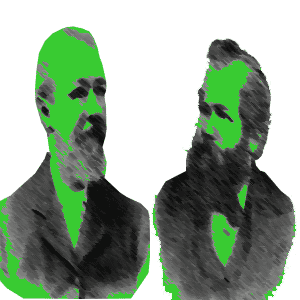
Joseph Henry Blackburne fought for chess supremacy against William Steinitz
Perhaps Steinitz gained inspiration from looking over some old Morphy games and identifying his secrets. Who knows? One way or another he had transitioned from the old approach to the new one and now he would dominate. The chess world was in uproar. Such blasphemy to abandon the beautiful patterns of yesteryear to take up this dull, defensive crime against the great game of chess. What an ugly and shameful way to win.
The next few years known as the Ink Wars would feature a war of words in the press between Steinitz and his Romantic opponents. It got quite nasty and personal. Blackburne was with the Romantic School. He likely didn't like Steinitz anyway as the two had been involved in more than one scuffle over the years. They played a match in 1876 to determine who was World #1. Steinitz hammered Blackburne 7-0.
Later Years
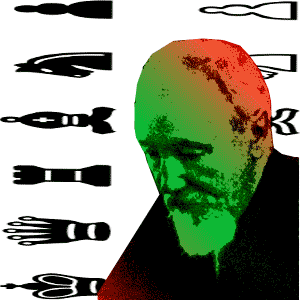
Joseph Henry Blackburne played top level chess well into his 70s
He put that behind him quickly to post his greatest tournament performance, winning the 1881 German Championship. He finished ahead of Zukertort and Mikhail Chigorin.
He remained competitive for the rest of this decade and still relatively good for another 30 years afterwards. He had been overtaken by Zukertort who would contest the First Official World Championship against Steinitz in 1886. Chigorin, Gunsberg and newcomer Emanuel Lasker would also overtake him in the coming years. He was knocked out in the preliminary round of St Petersburg 1914 but did beat Aron Nimzowitsch in that event. He was still giving blindfold exhibitions right up to the last few years of his life.
Legacy of Blackburne
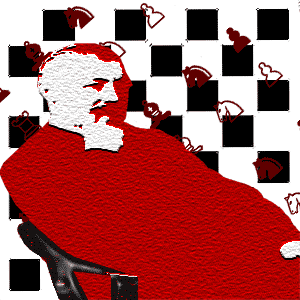
Joseph Henry Blackburne played beautiful, attacking chess and was an endgame specialist
Blackburne was a tactical player, always searching for an eye-catching combination to win his games in the true Romantic spirit. He was one of those who disapproved of the new positional school.
He was something of a rogue who drank hard and thought nothing of settling disagreements with his fists. He was a commoner dressed as a gentleman. His notoriety may have helped popularize the game as people were drawn by such an interesting character.
Moving On
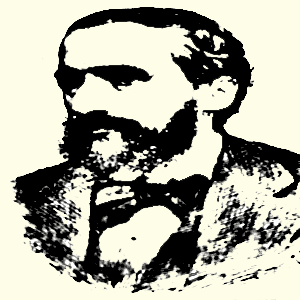
Johannes Zukertort
He would later prove this through his many outstanding achievements in chess. At his height in the early 1880s, he could have been considered second only to William Steinitz.
In fact Emanuel Lasker said Blackburne probably had more talent than Steinitz but not the work ethic or discipline necessary to become the World Champion. He was eventually overtaken by the man who would contest the first official World Championship against Steinitz. That man was Johannes Zukertort.






